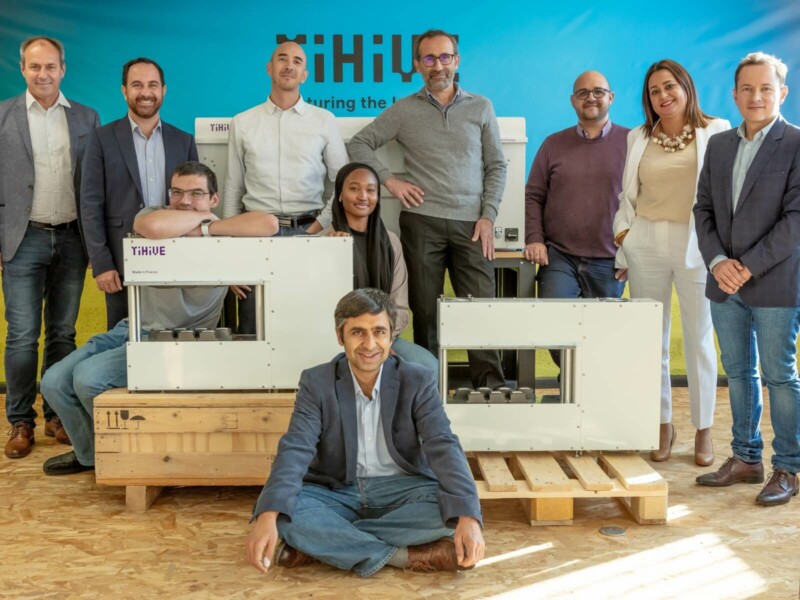
TiHive raises €8M to power efficient, high-quality productionof billions of products with Terahertz-AI
Grenoble, October 2nd, 2025. TiHive, an industrial deeptech company specializing in real-time, non-destructive, see-through quality and process control on production lines, has raised €8 million from Karista, Wind, and the EIC Fund to accelerate its growth and expand internationally.
Already adopted by several major industrial groups, TiHive’s technology - which combines industrial grade silicon-based terahertz imaging devices and artificial intelligence to enable real-time, non-destructive quality and process inspections directly on production lines - is now scaling globally.
This new round of funding will support the commercialisation of its patented industrial vision solutions, reinforce international deployment, particularly in hygiene, textiles, recycling, agriculture, and space industries, and accelerate R&D to develop a new generation of térahertz chips with extended frequencies and advanced AI features.
Backed by leading industrial and deeptech investors
Backed by support from the EIC Accelerator and Bpifrance, TiHive developed breakthrough Terahertz and AI-based inspection solutions - tested & validated by global leaders in the hygiene sector - and demonstrated strong industrial ROI. The company is now entering a new phase of international commercialization with a consortium of recognized deeptech and industrial investors.
The EIC Fund, TiHive’s long-standing partner, is joined by Karista, a deeptech hardware specialist, and Wind, a €130 million article 9 fund focused on climate adaptation solutions.
"With this funding, we’ll bring TiHive’s technology to more hygiene production lines worldwide and expand into new markets. Our goal is clear: qualify billions of products annually, helping manufacturers deliver best quality to their customers, reduce costs and save resources at scale." explains Hani Sherry, Founder & CEO of TiHive.
Absorbent Hygiene Industry: toward more sustainable and efficient production
Traditional solutions rely on sampling-based destructive methods to control quality and assess process stability. A pioneer in deploying industrial-grade terahertz systems at industrial scale, TiHive is reshaping quality and process inspection with its unique Terahertz-AI see-through solution that inspects all production in real-time and non-destructively.
“Too many products still ship unchecked, leading to dissatisfied customers, waste, inefficiencies, and avoidable costs. TiHive addresses this with terahertz-AI products and end-to-end support that integrate into existing processes and remain engaged until KPIs are achieved. Enabling better product quality, trust and reducing operational costs” said Hani Sherry, Founder & CEO of TiHive.
Investor quotes :
“The EIC Fund is glad to continue our journey with TiHive. They combine deep tech expertise in terahertz-on-silicon, artificial intelligence, and big data analytics to enhance efficiency, sustainability, and Europe’s strategic autonomy,” explains Svetoslava Georgieva, Chair of the EIC Fund Board.
“TiHive is a prime example of the deep tech projects Karista aims to support through Cosmi Capital: a truly disruptive technology delivering compelling benefits across a wide range of applications, in Space and beyond. Its products, which redefine what is possible, have the potential to revolutionize critical space technologies, from automated docking and space situational awareness to advanced data transmission.”, Emmanuel Daugeras, Partner at Karista.
About TiHive | https://tihive.com/
Founded in Grenoble in 2017 by Hani Sherry (CEO of TiHive, PhD in microelectronics and executive degrees in business and entrepreneurship) and Carlos Prada (CIO of TiHive, PhD in computer science, MBA in Finance, and executive degrees in business and entrepreneurship), TiHive designs industrial inspection solutions based on proprietary terahertz-on- silicon imaging and artificial intelligence.
This technology makes it possible to detect invisible features that conventional methods cannot see directlyon production lines – internal defects, poor material distribution, residual moisture, or thickness deviations and without destructive contact.
